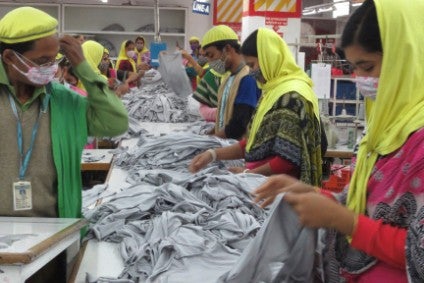
With Bangladesh’s second lockdown currently underway, new research offers recommendations on how brands and supply chains should respond to ensure the well-being of workers in the country’s garment industry.
The research by the Subir and Malini Chowdhury Center for Bangladesh Studies, UC Berkeley in collaboration with the Institute for Human Rights and Business (with support from UNDP Bangladesh and the Government of Sweden) includes surveys with senior brand executives and apparel suppliers.
And the resulting report, “The Weakest Link in the Global Supply Chain: How the Pandemic is Affecting Bangladesh’s Garment Workers,” finds workers in bangladesh’s garment industry are the most vulnerable to Covid-19 fallout
As the coronavirus spread across the world in early 2020 and a lockdown in Bangladesh became inevitable, businesses were forced to respond quickly to the evolving situation.
The report finds while the industry suffered from closure of markets, suspended shipments, delayed payments, and a liquidity crisis, Bangladeshi workers suffered what was in effect a 35% pay cut during the lockdown month.
Many Bangladeshi factories supplying to international brands consolidated their business and some went under. Many thousands of workers lost jobs and depleted their savings without having a safety net to fall back on.

US Tariffs are shifting - will you react or anticipate?
Don’t let policy changes catch you off guard. Stay proactive with real-time data and expert analysis.
By GlobalDataBut while campaigns by international civil society groups partly influenced some brands to honour their original contractual obligations, none of the brands interviewed for the report made direct financial contributions to either their suppliers (beyond their contractual obligations) or to the suppliers’ employees.
The report is drawn from in-depth interviews conducted between October 2020 and February 2021 with senior executives from international brands, Bangladeshi suppliers, representatives of the international civil society, and Bangladeshi labour activists.
“It is extremely critical, now more than ever, to engage in research to understand the impacts of Covid-19 throughout the world,” explains Dr Sanchita Saxena, director of the Chowdhury Center and co-author of the report.
“In Bangladesh, while the pandemic has disproportionately affected vulnerable communities, it has been particularly detrimental for the workers at the very bottom of global supply chains in the nation’s many garment factories.”
The research recommendations include proposed changes to policies and practices that can lead to long-term changes that would benefit global retailers, suppliers, and ultimately workers themselves.
- The Bangladesh government should strengthen social protection mechanisms, including health and social security benefits, and provide resources so that workers’ wages are not reduced during a crisis.
- Brands should ensure that their actions do not squeeze their suppliers, and use their resources and leverage to ensure liquidity for the suppliers. They should also avoid cancelling contracts, and pay for raw materials already acquired and work already undertaken.
- Suppliers – who bear direct responsibility for the well-being of the workers, should provide for the necessary infrastructure to ensure safe working conditions, and adhere to the disbursement wages as required by local laws.
- Local unions and labour rights advocates should work with their members to ensure they comply with the new standards and minimise disruption.
- International organisations should consider new initiatives that empower workers, enable suppliers to collaborate and negotiate as equal partners with major brands, and facilitate dialogue between brands and local unions.
- Consumers should inform themselves about work conditions at factories where their clothes are made and support more businesses that pay a living wage and ensure factories in their supply chains adhere to international standards.
“The pandemic has revealed the vulnerabilities of many groups, and Bangladesh’s workers in the readymade garment sector bore a disproportionate burden,” adds Salil Tripathi, IHRB’s senior adviser of global issues and the report’s co-author.
“While the scale of the pandemic took everyone by surprise, lessons must be learned from the experience so that the effect of Bangladesh’s second lockdown, now underway, causes the least harm to those who suffered the most the last time.”
Click on the following link to view the report: The Weakest Link in the Global Supply Chain: How the Pandemic is Affecting Bangladesh’s Garment Workers.




